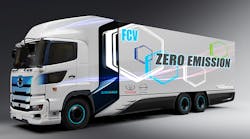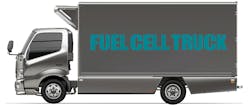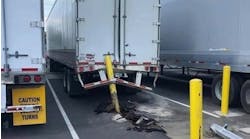Isuzu, Hino and Toyota have agreed on a new partnership to integrate Toyota's CASE technologies with commercial vehicles from Isuzu and Hino. CASE refers to "connected" cars, "autonomous / automated" driving, "shared", and "electric". Toyota has called the CASE “revolution” a “once-in-a-century period of profound transformation” for the automotive industry.
Through the new collaboration, announced March 24, the vehicle manufacturers aim to accelerate implementation and dissemination of CASE technologies and services and to help address various difficulties facing the transportation industry as well as help achieve a carbon-neutral society.
“To build an ever-better mobility society, it is becoming more important not to only compete but to also cooperate,” Toyota President Akio Toyoda said in a news conference that streamed online. “These days, it is hard to discern what is the correct way. And so we just have to give it a try, and then try again. It is through that process of repetition Toyota has achieved what it has.”
Hino has long represented the Toyota Group in the global heavy-duty trucks and buses market. With the new agreement, Hino and Isuzu will represent 80% of Japan's commercial vehicle customers, Toyoda noted.
The three companies plan to jointly work on the development of battery electric vehicles (BEVs) and fuel cell electric vehicles (FCEVs), autonomous driving technologies, and electronic platforms centered on small commercial-purpose trucks. Toyota and Hino announced last fall an agreement to conduct on-the-road trials of heavy-duty fuel cell electric trucks starting in spring of 2022. The companies also have agreed to jointly consider introducing light-duty FCETs, with trial operations in Japan by Seven-Eleven, FamilyMart, and Lawson set for this year.
While working together on BEVs and FCEVs to reduce vehicle costs, the three companies plan to advance infrastructure-coordinated societal implementation, such as by introducing FCEV trucks to hydrogen-based society demonstrations in Japan's Fukushima Prefecture, and accelerate dissemination from there.
Also, Isuzu, Hino, and Toyota plan to link their connected technology platforms to provide various logistics solutions that not only help improve commercial vehicle transport efficiencies but also contribute to reducing CO2 emissions.“It is difficult to popularize electrified vehicles unless they are promoted together with infrastructure. The introduction of the first-generation Mirai fuel cell vehicle made me realize this,” Toyoda said. “It is important to implement such technologies through commercial vehicles in unison with infrastructure. And, viewed from a user's perspective, shippers use both Hino and Isuzu trucks.”
To promote their partnership, Isuzu, Hino, and Toyota are establishing Commercial Japan Partnership Technologies Corp., a company for planning CASE technologies and services for commercial vehicles based on discussions among its three parent companies.
Going forward, Isuzu, Hino, and Toyota intend to deepen their collaboration while openly considering cooperation with other like-minded partners, the statement added.





